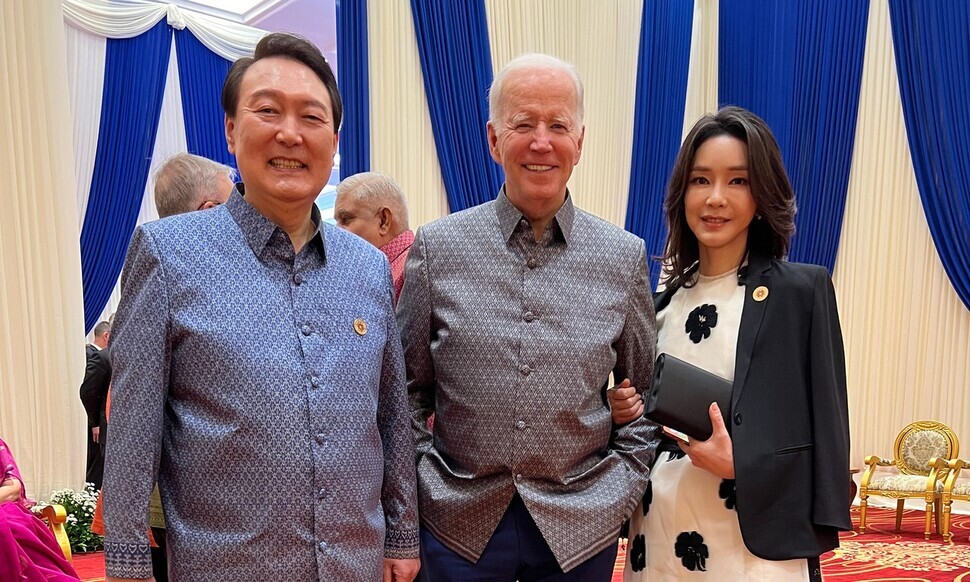hankyoreh
Links to other country sites 다른 나라 사이트 링크
Yoon’s Indo-Pacific strategy rolls back S. Korea's ambiguity on US-China rivalry

South Korea’s Indo-Pacific strategy, which was unveiled by President Yoon Suk-yeol during his summit with the Association of Southeast Asian Nations in Phnom Penh on Friday, amounts to a public declaration that Korea will stand with the US in its hegemonic and strategic rivalry with China.
What Yoon has dubbed “Korea’s Indo-Pacific strategy” resembles the US’ Indo-Pacific strategy in more than name only. The US’ strategy is designed to surround and contain China.
Former President Moon Jae-in distanced himself from both the US’ Indo-Pacific strategy and China’s Belt and Road Initiative in the “New Southern Strategy,” a policy for Southeast Asia, that his administration unveiled in November 2017. In that strategy, Moon mentioned the possibility of synergy with both countries’ strategies.
In contrast, the Yoon administration’s Indo-Pacific strategy is noticeably tilted toward the US.
On Sunday, Yoon said, “Key values such as regional freedom, human rights and the rule of law must be respected, and attempts to forcibly change the status quo must not be tolerated. The South China Sea needs to be a sea of peace and prosperity, a sea where the rules-based maritime order is protected. The freedoms of navigation and flight must be guaranteed according to the principles of international law, including the UN Convention on the Law of the Sea, and parties must refrain from behavior that would heighten tensions.”
With this overt reference to the freedom of navigation in the South China Sea, Yoon was clearly demonstrating a critical attitude toward China. Emphasizing the freedom of navigation in the South China Sea and opposing attempts to change the status quo by force are narratives that are used by the US and Japan when criticizing China.
Significantly, Yoon also proposed “organizing a meeting between the defense ministers of Korea and ASEAN member states” and expressed his intention to “proactively take part in joint exercises with ASEAN” while revealing an initiative for cooperation with ASEAN.
Yoon’s remarks can be taken as Korea volunteering to be a supplementary force to ease the US’ military burden in Southeast Asia, including the South China Sea. That’s quite a change from the Moon administration’s intention of making ASEAN a partner for the Korean Peninsula peace process and a market for Korean products that would rival China.
In addition, Yoon hinted that he will use his Indo-Pacific strategy as a means of mobilizing international support for putting pressure on North Korea.
“North Korea’s denuclearization is an absolute prerequisite for peace in the Indo-Pacific region. If North Korea pushes ahead with a nuclear weapon test or keeps test-launching intercontinental ballistic missiles, the international community needs to respond firmly,” he said.
While explaining Korea’s Indo-Pacific strategy on Saturday, Kim Sung-han, director of South Korea’s National Security Office, suggested the strategy could be used as a platform for backing up the US’ efforts to contain China and for broadening the international support base for pressuring North Korea.
“Since the US’ Indo-Pacific strategy erases ‘Asia’ from the ‘Asia-Pacific’ and inserts ‘Indo’ — that is, the Indian Ocean — instead, there’s no conceptual space for Asia. This is an unexpected and dangerous approach [for Korea to take],” said a respected figure in Korea’s foreign policy and national security sector.
By Lee Je-hun, senior staff writer; Bae Ji-hyun, staff reporter
Please direct questions or comments to [english@hani.co.kr]

Editorial・opinion
![[Column] Park Geun-hye déjà vu in Yoon Suk-yeol [Column] Park Geun-hye déjà vu in Yoon Suk-yeol](https://flexible.img.hani.co.kr/flexible/normal/500/300/imgdb/original/2024/0424/651713945113788.jpg) [Column] Park Geun-hye déjà vu in Yoon Suk-yeol
[Column] Park Geun-hye déjà vu in Yoon Suk-yeol![[Editorial] New weight of N. Korea’s nuclear threats makes dialogue all the more urgent [Editorial] New weight of N. Korea’s nuclear threats makes dialogue all the more urgent](https://flexible.img.hani.co.kr/flexible/normal/500/300/imgdb/original/2024/0424/7317139454662664.jpg) [Editorial] New weight of N. Korea’s nuclear threats makes dialogue all the more urgent
[Editorial] New weight of N. Korea’s nuclear threats makes dialogue all the more urgent- [Guest essay] The real reason Korea’s new right wants to dub Rhee a founding father
- [Column] ‘Choson’: Is it time we start referring to N. Korea in its own terms?
- [Editorial] Japan’s rewriting of history with Korea has gone too far
- [Column] The president’s questionable capacity for dialogue
- [Column] Are chaebol firms just pizza pies for families to divvy up as they please?
- [Column] Has Korea, too, crossed the Rubicon on China?
- [Correspondent’s column] In Japan’s alliance with US, echoes of its past alliances with UK
- [Editorial] Does Yoon think the Korean public is wrong?
Most viewed articles
- 1[Column] Park Geun-hye déjà vu in Yoon Suk-yeol
- 2Will NewJeans end up collateral damage in internal feud at K-pop juggernaut Hybe?
- 3N. Korean hackers breached 10 defense contractors in South for months, police say
- 4[Guest essay] The real reason Korea’s new right wants to dub Rhee a founding father
- 5Up-and-coming Indonesian group StarBe spills what it learned during K-pop training in Seoul
- 6[Editorial] Japan’s rewriting of history with Korea has gone too far
- 7Why Korea shouldn’t welcome Japan’s newly beefed up defense cooperation with US
- 8Terry Anderson, AP reporter who informed world of massacre in Gwangju, dies at 76
- 9Thursday to mark start of resignations by senior doctors amid standoff with government
- 10Senior doctors cut hours, prepare to resign as government refuses to scrap medical reform plan